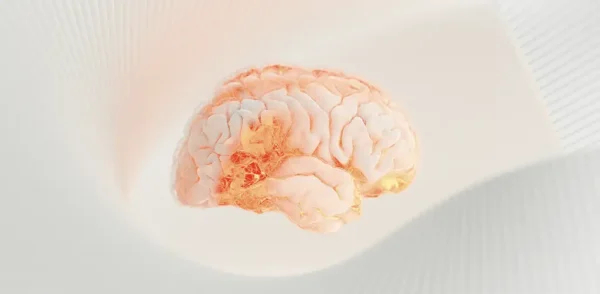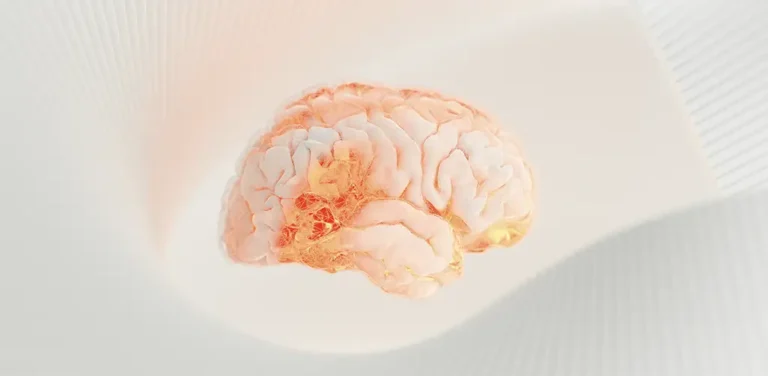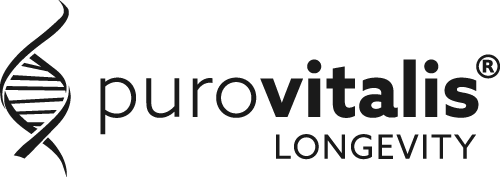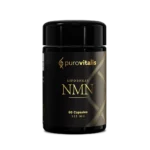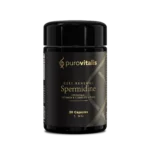
table of contents
- What affects brain health?
- Mental health is connected with brain health
- Foods for brain health
- Supplements for brain health
- Best brain supplement for every age
What affects brain health?
Brain health is determined by a complex interplay of genetic and lifestyle factors, and each of them has a significant role in cognitive function and resilience.
If your goal is to maintain brain health and mental sharpness for years to come, you need to know these factors.
Genetic factors
Inherited traits may influence susceptibility to conditions like Alzheimer’s disease or other forms of dementia. Specific gene variants, such as APOE4, are associated with an increased risk of cognitive decline.
What is APOE4?
APOE4 is a genetic variant of the APOE gene that’s linked to a higher risk of Alzheimer’s disease and faster cognitive decline. It affects how the brain transports fats and repairs neurons, making it a key factor in brain aging.
Related: Is longevity genetic? On the search for the longevity gene
Lifestyle factors
Genetic background is not the only key to your brain health and longevity. Certain lifestyle choices can mitigate genetic predispositions. These include regular activities that stimulate the brain, a balanced diet, and physical exercise.
A balanced diet, rich in omega-3 fatty acids, antioxidants, and vitamins, supports cognitive function.
Related: Clinical trial: Can omega-3, vitamin D, and exercise slow biological aging?
Physical exercise, particularly aerobic activities such as walking or swimming, enhances blood flow to the brain, which helps you maintain memory and focus for longer.
Sleep is another critical factor. Adequate rest (7-9 hours nightly) allows the brain to process information and repair itself.
Social activity engagement also matters for brain health: strong social connections reduce the risk of cognitive decline, while isolation can harm mental agility.
Mental health is connected with brain health
The connection between mental health and brain health is deep and well-proved, as emotional well-being directly influences cognitive function and vice versa.
A healthy brain supports stable mood, focus, and resilience to stress, while poor mental health can impair memory, decision-making, and the ability to repair neural pathways. Natural mental health supplements can support this interplay, since they target neurotransmitter balance and reduce inflammation.
Neurotransmitter support
Mental health conditions like anxiety, depression, or ADHD often stem from imbalances in neurotransmitters like serotonin or dopamine. Mental health supplements like Omega-3 fatty acids and magnesium can stabilize mood and improve focus.
For instance, a 2024 study showed Omega-3s reduced ADHD symptoms in children, making them a good option for brain health supplements for ADHD.
Stress and mood regulation
Chronic stress harms both mental and brain health by elevating cortisol, which damages neurons. Mental health supplements for men, such as Glycine, can speed up physical recovery and improve mood.
Foods for brain health
Making changes to your diet is the easiest way to give your brain a chance to age better.
People that consistently prioritize healthy foods get a boost in mental clarity, resilience, and cognitive function for years to come.
Below is a list of some of the best foods for brain health and longevity:
Fatty Fish
Fatty fish like salmon, mackerel, and sardines are among the best foods for brain health due to their high omega-3 fatty acid content.
Regular consumption of fatty fish supports memory, improves mood, and may reduce the risk of Alzheimer’s disease. Aim for two servings per week to optimize food and brain health benefits.
Blueberries
Blueberries are packed with antioxidants, polyphenols like resveratrol, flavonoids like antocyanins and quercetin, and a lot more. The compounds combat oxidative stress and inflammation in the brain, and they can enhance memory and delay cognitive decline.
Leafy greens
Leafy greens like spinach, kale, and broccoli are rich in vitamins K, E, and folate, which are vital for cognitive health. These nutrients support brain cell growth and protect against age-related decline.
Nuts and seeds
Walnuts, almonds, and chia seeds are excellent sources of vitamin E, healthy fats, and antioxidants. Vitamin E protects brain cells from oxidative damage (an ingredient in our Berberine Balance capsules), while healthy fats support neural repair.
Whole grains
Whole grains like oats, quinoa, and brown rice provide steady energy for the brain through complex carbohydrates. They also contain B vitamins, which support nerve function and reduce inflammation.
If you’re curious about how certain foods may support—or interfere with—long-term brain and overall health, read our blog about Dr. Gundry’s approach to nutrition and longevity. His insights offer a different perspective on how food choices can shape aging and cognitive function.
Supplements for brain health
Supplements can play a supportive role in optimizing brain health by letting you get nutrients that are harder to get from foods. Purovitalis offers European-made longevity supplements to support the aging of every function of your body, including brain health: memory, focus, and cell longevity.
Supplements are never a replacement for a healthy diet, but they can complement and attenuate your lifestyle.
Below is an overview of top *supplements for brain health, their research-backed benefits, and key elements, including select products from Purovitalis.
Omega-3 Fatty Acids
Omega-3s, particularly DHA and EPA, are essential for brain cell structure and function, reducing inflammation and supporting memory. Studies suggest omega-3s may benefit those with mild cognitive impairment or the APOE4 gene linked to Alzheimer’s, though large-scale trials show inconsistent results for broader populations.
B Vitamins (B6, B9, B12)
B vitamins, including B6 (pyridoxine), B9 (folate), and B12 (cobalamin), are critical for neurotransmitter synthesis and homocysteine metabolism. Elevated homocysteine metabolism is linked to cognitive decline (Bryan Johnson addresses that in his Blueprint protocol).
Our Spermidine supplement offers a balanced mix of B vitamins along with other ingredients that boost immune system and energy metabolism.
Vitamin D
Vitamin D is not just an all-around anti-aging compound; it supports cognitive function and may reduce dementia risk. A 2022 study linked vitamin D deficiency to cognitive decline, though supplementation results are mixed.
We offer high-precision Vitamin D testing kits so you can take data-driven decisions about your supplementation strategy, as well as the high quality Liposomal D3 capsules.
Magnesium
Magnesium supports over 300 neurological processes, including memory and mood regulation. Magnesium also affects sleep quality, which is essential for brain health and longevity.
Ginkgo Biloba
Ginkgo biloba is known for improving blood flow to the brain and supporting memory thanks to its quercetin content.
Ginkgo Biloba
Is an extract derived from the leaves of the ginkgo tree, one of the oldest tree species in the world. It is commonly used as a dietary supplement and is known for its potential effects on brain function and blood circulation. The tree itself can be seen and enjoyed in cities and parks all over the world.
Our product, Liposomal Quercetin, is over 99% pure and offers a great way to get this powerful antioxidant into your system.
Liposomal NMN Capsules
NAD+ (derived from its precursor NMN) is critical for brain cell energy metabolism and repair.
Studies suggest NMN supplementation may enhance cognitive function, reduce neuroinflammation, and protect against age-related cognitive decline by boosting NAD+ levels.
NMN users report improved energy and mental clarity, which can support focus and memory.
Our Liposomal NMN contains 125mg of 99% pure Nicotinamide Mononucleotide (NMN), a precursor to NAD+, which supports cellular energy and repair.
Best brain supplement for every age
Toddlers and kids
Normally, toddlers don’t need any special brain health supplements – their brain undergoes rapid growth and gets all the necessary nutrition from food if you keep it rich and diverse enough. Parents need to make sure their kids are getting enough protein, choline, zinc, iron, and vitamins B, C, and D.
Teens
Adolescence means increased cognitive demands from school and social life. Brain health supplements for teens, like magnesium and Omega-3s, support stress management and memory.
Adults (ages 19-59)
Brain health supplements for adults address productivity, stress, and the early prevention of cognitive decline. Resveratrol and quercetin combat oxidative stress, ginkgo biloba enhances blood flow, supporting memory.
Seniors (ages 60+)
Aging brains face risks of cognitive decline and neurodegeneration. Brain health supplements for seniors usually include omega-3s, B vitamins, and spermidine. Research shows that B vitamins slow brain atrophy, while spermidine supports autophagy.
What is Autophagy?
Autophagy is the body’s natural process of cleaning out damaged cells and recycling them into new, healthy components.
Final thoughts on brain health and longevity
Brain health isn’t just about avoiding decline—it’s about giving yourself the best chance to think clearly, stay focused, and feel balanced throughout life. The choices you make each day—what you eat, how you move, how well you rest—all play a role. And while no supplement can replace healthy habits, the right support can make a meaningful difference over time.
At Purovitalis, we’re committed to providing thoughtful, quality-controlled EU-made supplements for every aspect of longevity, including brain health! Our supplements are high-quality and based on research and transparency. If your goal is to support long-term cognitive health, it’s worth paying attention to the small things that add up—nutrients, routines, and staying curious.
References
- DiBattista AM, Heinsinger NM, Rebeck GW. Alzheimer’s Disease Genetic Risk Factor APOE-ε4 Also Affects Normal Brain Function. Curr Alzheimer Res. 2016;13(11):1200–7. PMID: 27033053; PMCID: PMC5839141.
- Goldman B. Why is a common gene variant bad for your brain? The answer offers clues for a new kind of Alzheimer’s drug. Alzheimer’s. 2024 Aug 23.
- LeWine HE. Foods linked to better brainpower. Harvard Health Publishing. 2024 Apr 3.
- Centers for Disease Control and Prevention. Physical Activity Boosts Brain Health. CDC.gov. 2025 Jan 31.
- Holt-Lunstad J. Social connection as a critical factor for mental and physical health: evidence, trends, challenges, and future implications. World Psychiatry. 2024 Sep 16;23(3):312–32. doi: 10.1002/wps.21224. PMID: 39279411; PMCID: PMC11403199.
- Guarnera J, Yuen E, Macpherson H. The Impact of Loneliness and Social Isolation on Cognitive Aging: A Narrative Review. J Alzheimers Dis Rep. 2023;7(1):699–714. doi: 10.3233/ADR-230011. PMID: 37483321; PMCID: PMC10357115.
- Shaw G. How Mental Health and Brain Health Are Connected. Psychology Today Magazine. 2023 Feb/Mar.
- Yatzkar U, Amir E, Tamir S, Armon-Omer A. Omega-3 Fatty Acid Supplementation Improves Attention Deficit-Hyperactivity Disorder Symptoms in Children. Curr Psychiatry Res Rev. 2024;20(1):48–58. doi: 10.2174/2666082219666230103113402.
- Pearson K. How Omega-3 Fish Oil Affects Your Brain and Mental Health. Healthline. Updated 2023 Jul 25.
- Wu A, Ying Z, Gomez-Pinilla F. Vitamin E protects against oxidative damage and learning disability after mild traumatic brain injury in rats. Neurorehabil Neural Repair. 2010;24(3):290–8. doi: 10.1177/1545968309348318. PMID: 19841436; PMCID: PMC2824788.
- Grow G. Brain Foods to Boost Mental Clarity. Wellbeing Blog. 2024 Aug 15.
- Wei BZ, Li L, Dong CW, Tan CC, Xu W; for the Alzheimer’s Disease Neuroimaging Initiative. The Relationship of Omega-3 Fatty Acids with Dementia and Cognitive Decline: Evidence from Prospective Cohort Studies of Supplementation, Dietary Intake, and Blood Markers. Am J Clin Nutr. 2023;117(6):1096–109. doi: 10.1016/j.ajcnut.2023.04.001. PMID: 37028557; PMCID: PMC10447496.
- Kennedy DO. B Vitamins and the Brain: Mechanisms, Dose and Efficacy—A Review. Nutrients. 2016;8(2):68. doi: 10.3390/nu8020068. PMID: 26828517; PMCID: PMC4772032.
- Salamon M. Low vitamin D levels may increase odds of dementia. Harvard Women’s Health Watch. 2022 Oct 1.
- Ścibior A, Llopis J, Dobrakowski PP, Męcik-Kronenberg T. Magnesium (Mg) and Neurodegeneration: A Comprehensive Overview. Int J Mol Sci. 2024;25(23):12595. doi: 10.3390/ijms252312595.
- Huebbe P, Wagner AE, Boesch-Saadatmandi C, Sellmer F, Wolffram S, Rimbach G. Effect of dietary quercetin on brain quercetin levels and the expression of antioxidant and Alzheimer’s disease relevant genes in mice. Pharmacol Res. 2010;61(3):242–6. doi: 10.1016/j.phrs.2009.08.006.
- Yu B, Jing X, Jia L, Wang M, Liu L, Ping S, Wang Y, Yang M. The versatile multi-functional substance NMN: its unique characteristics, metabolic properties, pharmacodynamic effects, clinical trials, and diverse applications. Front Pharmacol. 2024 Oct 1;15. doi: 10.3389/fphar.2024.1436597.
- UCLA Health. Baby brain food: 7 foods to fuel brain development. UCLA Health Blog. 2022 May 5.
- Jakubowski H, Zioła-Frankowska A, Frankowski M, Perła-Kaján J, Refsum H, de Jager CA, Smith AD. B Vitamins Prevent Iron-Associated Brain Atrophy and Domain-Specific Effects of Iron, Copper, Aluminum, and Silicon on Cognition in Mild Cognitive Impairment. J Alzheimers Dis. 2021;84(3):1039–55. doi: 10.3233/JAD-215085. PMID: 34602484; PMCID: PMC8673493.
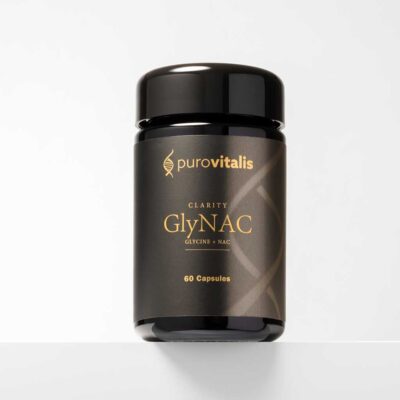
GlyNAC – Powerful Cellular Synergy Support glutathione production Fuel cellular energy
Experience the proven synergy of Glycine and N-Acetyl-Cysteïne. Together, they work more effectively than alone to restore glutathione levels, enhance mitochondrial function, and reduce oxidative stress.

spermidine Fusion autophagy support Liposomal delivery
Regulate your body’s natural cleansing process! Try it out!
